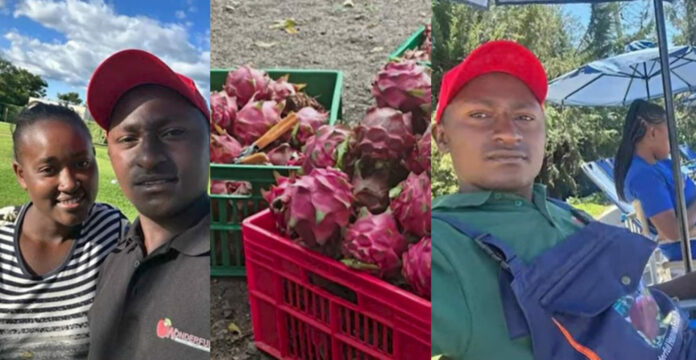The popularity of dragon fruit in the Kenyan market is on the rise, and this is driving more and more farmers to join the trend. This is because of the dragon fruit’s rarity in the African market and its intrinsic value.
Priscilla Nyairia and her husband are the owners of a successful dragon fruit farm situated in Laikipia County. Their farm, Wonderful Heaven Orchard, has a variety of fruit trees, including pomegranates, apples, peaches, and mulberries.
However, their focal investment is directed towards cultivating the red-skinned dragon fruits.
In an interview with Lynn Ngugi, Priscilla Nyairia explained that her introduction to dragon fruit cultivation came through her husband, whom she had met during their campus days while they were both on attachment.
While her husband pursued a course in Business & IT at SEKU, he had a strong agricultural background. Priscilla was studying computer science during their time in college.
The couple’s journey started by importing their initial dragon fruit seedlings from The Philippines. Each seedling had a price of $10, and they had to pay an additional $10 for transportation. Therefore, the total cost for each seedling amounted to $20.
Their modest beginnings in farming saw them plant 100 dragon fruit trees in 2020. As the dragon fruits continued to thrive, they expanded their farm by propagating cuttings and transplanting them, incurring a total cost of Sh. 200,000.
Walter Muange: Farmer reaping millions per year from Kenya’s ‘most expensive’ fruit
In 2021, a year after planting, the couple enjoyed their first bumper harvest. During that period, a single dragon fruit in Kenya was being sold for Sh. 1,000.
They achieved sales exceeding Sh. 1 million from the produce of their 200 dragon fruit plants, resulting in profits of Sh. 800,000 in their first season.
Following their success, the couple has never looked back since. Priscilla shared that many Kenyans tend to have doubts about dragon fruit thriving in Kenyan soil, but their experience and determination have proven otherwise.
For example, 9 months after propagating the seedlings, the couple sought the advice of an agronomist. The agronomist expressed a negative sentiment on the feasibility of cultivating this fruit, considered to be the world’s most expensive fruit.
“We Kenyans believe what we read in the books and trust white people more than our potential,” Nyairia said in the interview.
Dragon fruit plants can yield up to four harvest seasons per year, and a single plant has the potential to produce up to 50 fruits during each season.
The cost of dragon fruits in Kenya has decreased to Sh. 300 due to increased competition in the market. However, a kilogram of dragon fruit can still be sold for prices ranging from Sh. 700 to Sh. 1,000.
Priscilla Nyairia advocates for more Kenyans to join the movement in growing this mystical fruit. She has created employment opportunities for over 10 farmhands and numerous casual labourers within her community.
Chinese farmers making millions from 260-acre Dragon Fruit farm in Naivasha
Priscilla’s main challenge in the dragon fruit business is the inability to meet the consistently high and ever-present demand for the fruit. This is precisely why she encourages more farmers to seize the opportunity and engage in dragon fruit cultivation to help address this growing demand.
In the future, she looks to expand her farm and grow the dragon fruits on 10 acres of land. Priscilla Nyairia emphasized that dragon fruit plants demand meticulous care and attention.
To facilitate their optimal growth, they need a weekly supply of at least 10 litres of water. Additionally, the application of organic manure is important for their proper development.
Dragon fruits are known to help prevent chronic illnesses such as cancer and diabetes. They are also very rich in Vitamin C and fibre contents.








